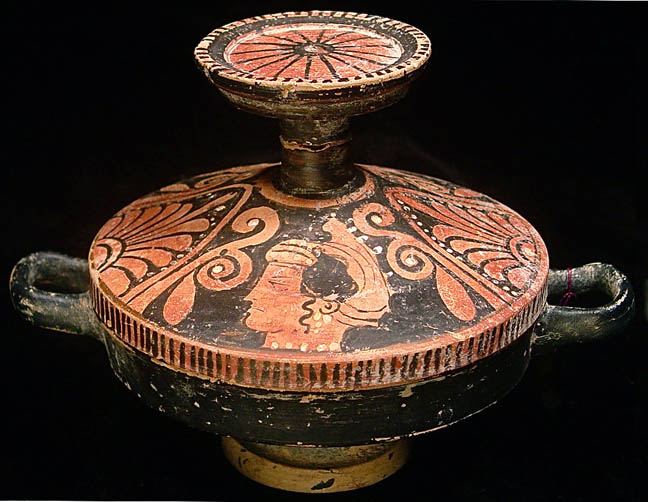

Title: Two Ancient Clay Ceramic Objects Aqulian Greek Red Figure Lekanis
Shipping: $150.00
Artist: N/A
Period: Antiquity
History: N/A
Origin: Southern Europe > Italy
Condition: Museum Quality
Item Date: 4th century BC
Item ID: 5021
4th century BC. Two ancient and very old apulian clay ceramic Objects Greek red-figure lekanis with a knob handle. The lid is decorated with two elaborately coiffured designs in profile. APULIAN GREEK RED FIGURE LEKANIS, Southern Italy, c. 4th century BC. With the head of a lady of style on side A, a leopard on side B. 8 inches across handles, 5 inches in height. Intact. The output and quality of the Greek colonial potters working in Apulia increased greatly following the Peloponnesian War when Attic exports fell off sharply. Apulian craftsmanship is an amalgamation of the Ionian (Athenian, Attic) conventions, and Doric (Western colonial Greek) styles, with a noticeable native Italian aesthetic. We are pleased to offer this excellent and great quality antiquity Collection. This is a one time opportunity to acquire these fine antiquities. The antiquities in this Collection were acquired primarily over the past 30 years. They are numerous and varied and include a good selection of Greek, Egyptian, Near Eastern and Holy Land, Chinese, pre-Columbian and African art. The collector has now moved on to other interests and is in the process of deaccessioning his antiquities collection. Collectors who have an interest in pieces not individually listed are invited to inquire as to the particulars. The authenticity and condition of all pieces has been carefully vetted by experts. We are proud of our extensive list. Some of the art items in our inventory, are published in books and academic journals. Ancient Rome was a civilization that grew out of the city-state of Rome, originating as a small agricultural community founded on the Italian Peninsula in the 9th century BC. In its twelve centuries of existence, Roman civilization shifted from a monarchy to an oligarchic republic to an increasingly autocratic empire. Roman civilization is often grouped into "classical antiquity" with ancient Greece, a civilization that inspired much of the culture of ancient Rome. Ancient Rome contributed greatly to the development of law, war, art, literature, architecture, and language in the Western world, and its history continues to have a major influence on the world today. The Roman civilization came to dominate Western Europe and the Mediterranean region through conquest and assimilation. Throughout the territory under the control of ancient Rome, residential architecture ranged from very modest houses to country villas. A number of Roman founded cities had monumental structures. Many contained fountains with fresh drinking-water supplied by hundreds of miles of aqueducts, theatres, gymnasiums, bath complexes sometime with libraries and shops, marketplaces, and occasionally functional sewers.
Link: http://en.wikipedia.org/wiki/Ancient
Ancient Antiquity (noun) and ancient (adjective) may refer to: Any period before the Middle Ages (476-1453), but still within the period of human history or prehistory. The term is most often used of Classical Antiquity, the classical civilizations of the Mediterranean, especially Ancient Greece and Ancient Rome.
The times before writing belong either to protohistory or to prehistory.Ancient history is the study of the written past from the beginning of recorded human history to the Early Middle Ages. The span of recorded history is roughly 5,000 years, with Cuneiform script, the oldest discovered form of coherent writing, from the protoliterate period around the 30th century BC. This is the beginning of history, as opposed to prehistory, according to the definition used by most historians. The term classical antiquity is often used to refer to ancient history in the Old World since the beginning of recorded Greek history in 776 BC (First Olympiad). This roughly coincides with the traditional date of the founding of Rome in 753 BC, the beginning of the history of ancient Rome, and the beginning of the Archaic period in Ancient Greece. Although the ending date of ancient history is disputed, some Western scholars use the fall of the Western Roman Empire in AD 476, the closure of the Platonic Academy in 529 AD, the death of the emperor Justinian I, the coming of Islam[8] or the rise of Charlemagne as the end of ancient and Classical European history. In India, the period includes the early period of the Middle Kingdoms, and, in China, the time up to the Qin Dynasty is included.
Archaeology is the excavation and study of artifacts in an effort to interpret and reconstruct past human behavior. Archaeologists excavate the ruins of ancient cities looking for clues as to how the people of the time period lived. Archaeology, is the discovery of studying ancient history: